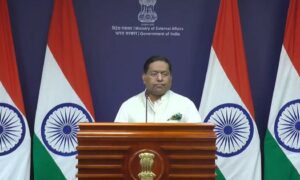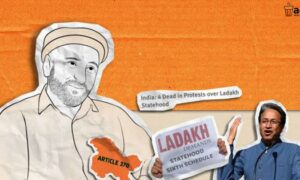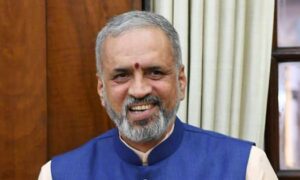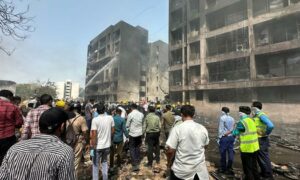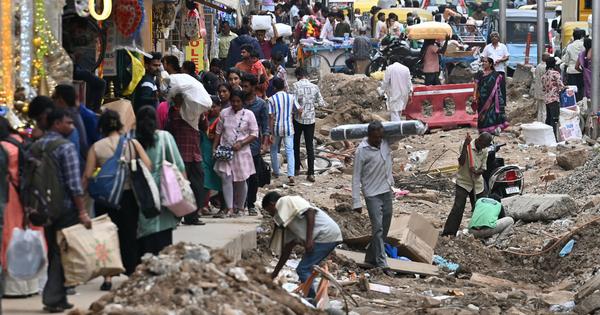
In mid-October, when billionaire entrepreneur Kiran Mazumdar-Shaw urged the Karnataka state government to fix Bengaluru’s crumbling civic infrastructure – from battered roads and piled-up debris to garbage mismanagement and water-logging – her remarks struck a chord with thousands of frustrated citizens.
Soon after, she met Chief Minister Siddaramaiah and Deputy Chief Minister DK Shivakumar, who assured her that the government was working with purpose and urgency. Mazumdar-Shaw, for her part, pledged her full cooperation and reiterated her pride in the city.
What went largely unremarked in this exchange, however, was that responsibility for these issues rests not with the state government but with the city’s municipal bodies. Those bodies have not elected members for more than five years. As a result, a city of over 13 million people continues to be run by appointed officials and ad-hoc administrators rather than representatives chosen by its residents.
I had an overseas business visitor to Biocon Park who said ‘ Why are the roads so bad and why is there so much garbage around? Doesn’t the Govt want to support investment? I have just come from China and cant understand why India can’t get its act together especially when the…
— Kiran Mazumdar-Shaw (@kiranshaw) October 13, 2025
Adding another layer to this democratic vacuum was the dissolution in September of the 18-year-old Bruhat Bengaluru Mahanagara Palike. Instead, the city will have a new governance structure with the recently created Greater Bengaluru Authority at its apex. The authority, chaired by the chief minister, will be in charge of city-wide planning and coordination.
The former Bruhat Bengaluru Mahanagara Palike area has been divided into five new municipal corporations, each responsible for local civic operations. The restructuring has been billed as a way to fix the administrative inefficiencies and poor service delivery that plagued the Bruhat Bengaluru Mahanagara Palike, especially as Bengaluru’s population and urban sprawl grew rapidly.
We are in this dire situation because of past Govts failure to act in time. This Government has the opportunity to change this n act fast to fix these decades of deteriorating infrastructure n garbage management.
— Kiran Mazumdar-Shaw (@kiranshaw) October 15, 2025
Yet these new municipal corporations remain unelected, and the Greater Bengaluru Authority’s leadership rests firmly with the state government. For more than five years – split roughly equally between the Bharatiya Janata Party and Congress administrations in the state – Bengaluru has not had elected corporators, ward committees, or a mayor. The governance vacuum has meant that accountability for civic failures is dispersed and diluted.
The timeline of delays tells its own story. The term of the last council of the Mahanagara Palike ended in September 2020 and elections should have followed immediately. Instead, the BJP government of the time introduced legislation to expand the limits of the Bruhat Bengaluru Mahanagara Palike and increase the number of wards. This required a fresh delimitation exercise.
The process was repeatedly delayed, with excuses ranging from technical formalities to the Covid-19 pandemic and disputes over reservation quotas. Even when the Karnataka High Court directed that elections be held, the state government appealed to the Supreme Court, further pushing the process into uncertainty.
Before the state assembly elections in 2023, the Congress criticised the delay. But soon after it returned to power, it adopted the same cautious approach. The government withdrew existing ward notifications, re-initiated delimitation and introduced the Greater Bengaluru Governance Bill – the law that eventually replaced the Bruhat Bengaluru Mahanagara Palike with the Greater Bengaluru Authority and the five corporations.
The stated aim was reform and decentralisation, but the result has been continued postponement of elections. Today, both major parties appear equally unwilling to cede real control to elected local representatives.
The deeper reason is resistance to decentralisation itself. Local body elections would transfer a portion of power and resources from state legislators to corporators. Bengaluru’s legislators, cutting across party lines, have little incentive to allow this. Without elected councillors, Members of the Legislative Assembly can exert direct control over civic works, budget allocations and project contracts.
This arrangement serves political convenience: it keeps funds and influence concentrated while insulating MLAs from local-level scrutiny.
The problem is structural as much as political. Bengaluru’s civic agencies, already overlapping and complex, operate more like administrative departments than representative institutions. In the absence of elected councillors, ward-level oversight is carried out by officers answerable upward to the bureaucracy, not outward to citizens. This erodes the spirit of the 74th Constitutional Amendment, which was meant to empower urban local bodies as the third tier of governance. Instead of decentralising, power has been consolidated upwards – even as the rhetoric of reform continues.
The consequences are visible in the city’s day-to-day life. Roads deteriorate faster than they can be repaired, storm-water drains overflow with every heavy shower, and garbage collection swings between neglect and crisis. Citizens lack a political representative directly accountable for these failures. Complaints to ward offices or engineers may result in minor fixes, but the absence of an elected council means no one faces electoral consequences.
The public, in turn, channels anger toward the state government or individual ministers, while the local governance structure remains hollow.
Civic activists and former corporators have long warned that the absence of elected representatives weakens participatory governance. Without councillors, ward committees, which once provided a forum for residents to voice their concerns, rarely meet. Administrative officers, stretched thin across multiple functions, seldom engage directly with citizens. Former corporators, regardless of party, admit that constituents still approach them daily, though they hold no official authority. This informal system, dependent on personal networks rather than institutional mechanisms, leaves residents with few reliable avenues for redress.
The political incentives for delay are obvious. Local body elections in a city as large and economically significant as Bengaluru inevitably involve high-stakes competition, money and influence. Each ward election brings internal rivalries, factional disputes and risks of rebellion within party ranks. Holding polls means confronting intra-party conflict – something both major parties would prefer to postpone, especially close to assembly or parliamentary elections.
The government has now promised to issue the final delimitation notification soon and publish the reservation list by mid-December. Municipal elections, it says, could then be held soon thereafter, subject to clearance from the State Election Commission.
Yet Bengaluru’s experience over the past five years offers little reason for optimism. Unless the process moves decisively this time, these assurances risk sounding like familiar political choreography – an expression of intent without genuine commitment.
Meanwhile, governance continues through appointed officials and ad-hoc arrangements. In the absence of elected councils, the municipal corporations are run by administrators, and state legislators function as de facto “super-corporators”, directing civic works and funds. This concentration of power erodes accountability and distorts urban priorities: infrastructure projects are planned and executed through top-down directives, with little ward-level consultation or oversight. The result is a governance model in which the city is managed but not governed, administered but not represented.
Bengaluru’s predicament is part of a broader national pattern, with several major cities, including Mumbai, functioning without elected local governments for years. But the contradiction is particularly stark here. A global technology hub that prides itself on innovation and civic activism remains without the most basic element of democratic urban governance: an elected council.
Kiran Mazumdar-Shaw’s appeal for civic improvement was timely, but it also underscored a larger truth. The state can promise better infrastructure, but sustainable change requires institutions accountable to citizens. Without elected local bodies, pledges of reform will rest on administrative goodwill rather than democratic legitimacy.
A city cannot claim world-class aspirations while neglecting the fundamental tenet of representative governance. Decentralisation is the basis of democratic accountability. Until the people of Bengaluru can once again elect those who govern their neighbourhoods, the city’s civic problems will remain less a failure of capacity than a failure of will.
Vishal R Choradiya is an assistant professor with the Department of Professional Studies, Christ University, Bengaluru.
📰 Crime Today News is proudly sponsored by DRYFRUIT & CO – A Brand by eFabby Global LLC
Design & Developed by Yes Mom Hosting


